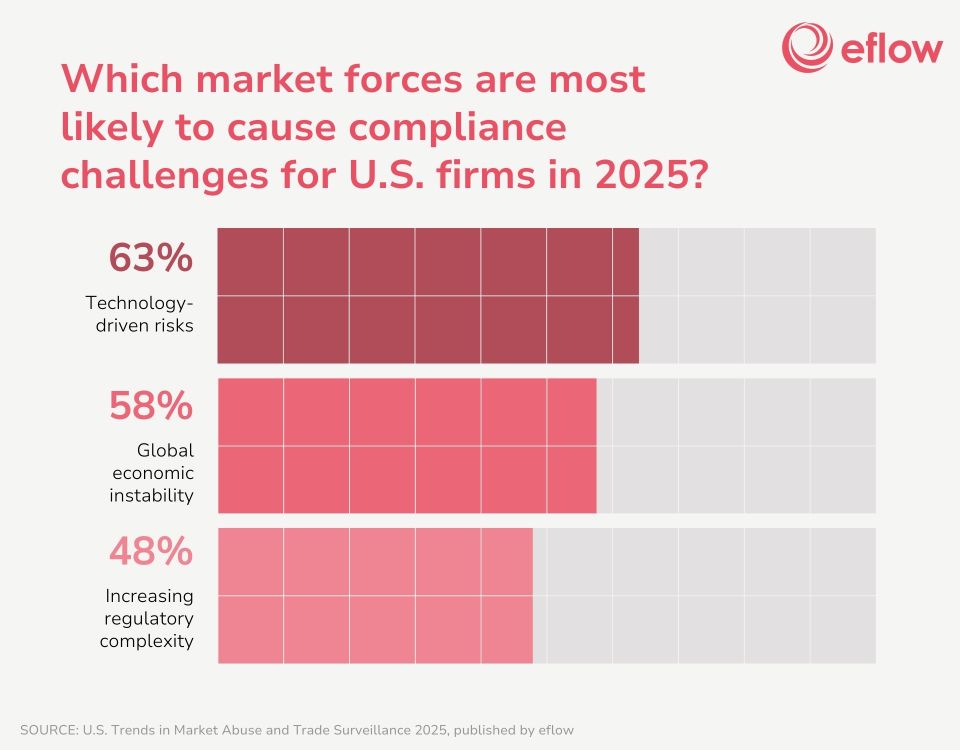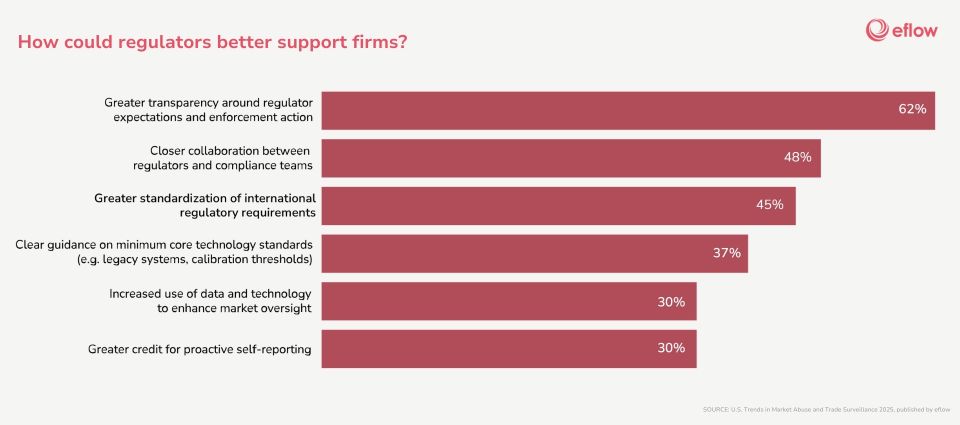eflow Global publishes U.S Trends in Market Abuse and Trade Surveillance 2025
BOSTON, May 6, 2025 – According to a newly released survey of U.S. regulatory compliance professionals, nearly two-thirds (63%) indicate that technology-driven risk is the most significant market force likely to cause compliance issues for U.S. financial services firms in 2025. Other market forces cited are global economic instability (58%), increasing regulatory complexity (48%), digital assets and crypto markets (37% each) and geopolitical instability (20%).

The survey, conducted by eflow Global for its second annual “U.S. Trends in Market Abuse and Trade Surveillance 2025” report, provides an analysis of market abuse enforcement, trends and challenges faced by compliance teams in the U.S. as well as how the U.S. stacks up against the rest of the world. Overall, 300 total (60 per country) final or joint decision-makers or those part of a team that makes decisions about regulatory compliance were surveyed in three continents in January 2025.
When asked to rank market abuse and what the main regulatory challenges keeping them up at night are, U.S. regulatory compliance professionals cited keeping abreast of regulatory changes (43%), assessing risk profiles across multiple asset classes (42%) and accurately identifying insider trading and market manipulation (40%) as their top three choices. This was followed by integrating trade and electronic communications (or eComms) surveillance as part of a holistic strategy and being able to fully understand and explain the output of trade surveillance reports – each at 38%.
In 2024, U.S. regulators levied $1.67 billion in fines against financial firms, representing a majority of the $1.84 billion in fines imposed by regulators globally. This is slightly below the five-year peak of $1.9 billion in fines levied globally in 2022, however, the penalties are spread across a significantly higher number of enforcement actions, highlighting that regulators are targeting a wider cross-section of firm types and sizes. Of the total fines imposed against U.S. firms, the largest amount was for eComms record-keeping violations ($740.7 million), followed by trade surveillance systems and controls ($562.4 million), insider trading ($305.8 million), market manipulation ($51.3 million), short selling violations ($6.7 million) and trade reporting ($4.7 million).
“U.S. regulators continued to focus on eComms surveillance failures as a major enforcement area in 2024 while our survey revealed that just 52% the country’s regulatory professionals have only some degree of confidence in their firm’s ability to integrate trade and eComms data as part of a holistic approach to trade surveillance,” said Ben Parker, CEO, eflow Global.
“With the volume of global enforcement actions surging by 260% year-over-year in 2024, and regulators increasingly targeting small- and mid-market firms, this should serve as a wake-up call for the thousands of smaller financial institutions and trading firms seeking to proactively enhance their compliance operations.”

When asked how regulators could better support firms in their efforts to ensure regulatory compliance, more than six out of 10 (62%) cited the need for greater transparency around regulator expectations and enforcement action. Forty-eight percent said closer collaboration between regulators and compliance teams followed by greater standardization of international regulatory requirements (45%), clear guidance on minimum core technology standards (37%) and increased use of data and technology to enhance market oversight and greater credit for proactive self-reporting (30% each).
To download the full report, click here.



